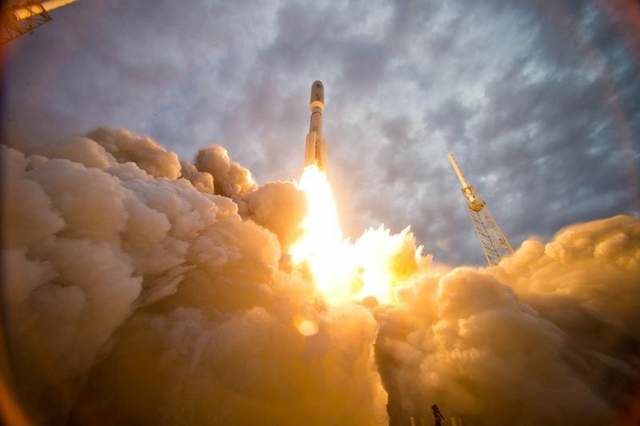It’s ‘War’ Twixt Appropriators & Authorizers Over RD-180s: Sen. Durbin
Posted on

Russian-made RD-180 engines propel an Atlas V rocket heavenward.
CAPITOL HILL: The Senate battle over Russian rockets keeps rocking. Senators Dick Durbin and Richard Shelby sent most of this morning’s defense appropriations hearing defending the Pentagon’s plan to keep using the cheap and technologically reliable but politically toxic RD-180 until an American-made replacement is ready, sometime around 2020-2021. Durbin and Shelby denounced the effort by Senate Armed Services chairman John McCain to get rid of the Russian-made rocket motors immediately, calling it a rash move that would risk the military’s “assured access” to space, undermine competition, and increase costs by $1 to to $5 billion.
“There is a war….between the authorizing committee and the appropriations committee,” Durbin said, hastily correcting his slip to “debate.” “There’s a belief on the authorizing committee that we should stop cold, not buy any more of these Russian engines,” the senator said. “What I have heard from the Department of Defense is that would leave the United States vulnerable.”
The Pentagon’s top procurement official, Frank Kendall, was more than happy to provide Durbin and Shelby with ammunition. McCain’s plan would swiftly ground the Boeing-Lockheed United Launch Alliance, whose EELV rockets use the RD-180. That would force the Defense Department to launch its satellites — for communications, for navigation, for spying on (say) the Russians — using either the Falcon 9 rocket from Elon Musk’s SpaceX, which is relatively unproven, or the Delta IV, which is proven but larger and much more expensive.
“Estimates do vary widely” depending on how soon you switch to Deltas and how long you stick with them, Kendall said, but “I have not seen any numbers below $1 billion.”
Durbin’s preferred estimate was $2 billion. For that, “we can replace every Humvee in the Marine Corps, increase pay raises for our troops, [or] keep the A-10 flying for five more years,” he said. “I don’t want to continue to subscribe to this Russian engine any more than we have to, but I think it’s shortsighted for us to say… as some on the authorizing committee have said, we’ll cut them off cold turkey.”
What if the Russians cut us off? asked Montana Sen. Jon Tester.
That’s a “concern” but not something they’ve actually threatened yet, Kendall replied. In any case, if manufacturer Energomash fulfills its current contract, that will deliver enough RD-180s to last until an American replacement engine is ready. The Russians have never interfered with RD-180 deliveries, no matter the political situation. Even after the US imposed a range of sanctions during the Russian invasion of Ukraine and illegal annexation of Crimea, Russian officials took no actions to curtail cooperation on the rocket.
When we’re relying on Russia for something so critical, Tester said, “the optics are horrible.”
“We’re dealing with more than optics here,” Sen. Shelby countered shortly thereafter. “We’re dealing with some real implications for national security.”

Elon Musk
The Competition Question
Despite his defense of the RD-180 engines, Sen. Durbin didn’t give the United Launch Alliance a free pass. He contrasted the “sizable subsidies” given ULA with what he called the privately-funded SpaceX. Looking at the two potential manufacturers of a next-generation rocket, Durbin likewise contrasted Blue Origin’s determination to rely on private funds while rival Aerojet seeks a public-private partnership with the Air Force.
“Don’t we put a finger on the scale if we say one of the competitors is subsidized by the federal government?” Durbin asked.
“I wouldn’t refer to the contracts we’ve had [with ULA] as subsidies,” Kendall replied. “We got value for our money,” specifically a capacity to launch satellites.
What Kendall didn’t say is that SpaceX and Blue Origin are both privately-held pet projects of visionary billionaires — Elon Musk and Jeff Bezos respectively — who can fund R&D out of their own pockets. Aerojet and ULA partners Boeing and Lockheed are all publicly-traded companies who don’t have that option.
That said, the Pentagon is happy to piggyback on private investments to reduce its own costs.
“It’s competitive,” Kendall said. “If we’re getting very large private investments on the one hand that are reducing the cost of one option, and we’re not getting them on the other hand, we’re going to go with the lower-cost option in all likelihood.”
Subscribe to our newsletter
Promotions, new products and sales. Directly to your inbox.
